- Home
- Mary Downing Hahn
Took: A Ghost Story Page 2
Took: A Ghost Story Read online
Page 2
The moving truck arrived before we’d finished breakfast, and Mom put us all to work. We picked our bedrooms first. Mine overlooked the woods, which were not quite as close to the house as I’d thought the night before, but close enough for me to see a deer pause at the edge of the trees and then vanish into the shadows. The lawns in Connecticut were overrun with deer, but this was a wild deer and therefore more noble than the ones who ate our shrubbery and our flowers and the vegetables Mom tried to grow.
Erica’s room was across the hall from mine, at the front of the house. Mom and Dad were next to her. The bedroom beside mine was reserved for Dad—his office, he called it. At the end of the hall was a small room, probably a sewing room, Mom said, or a nursery. She claimed it for her weaving. “The loom will fit just right under the windows,” she said.
The moving men spent most of the day tramping around the house, upstairs and down, putting furniture where Mom told them to. When they finally drove away, Mom gave us our next tasks. Unpack our clothes and belongings and put them away.
I finished first and stopped in Erica’s room to see how she was doing. Her clothes lay in a heap on her unmade bed. Her boxes of toys and books sat in the middle of the floor, where the moving men had left them, still taped shut. Erica sat on a window seat, her back to me. She held Little Erica.
“We don’t like it here,” Erica whispered to the doll. “It’s a bad, scary place, no matter what they say. You and I know, but nobody believes us.”
Little Erica had nothing to say that I could hear, but my sister bent her head close to the doll as if she were listening to her. “Yes,” she murmured. “Yes.”
I hated to interrupt the weird conversation, but I stepped into the room and said, “Mom told you to put your stuff away, but you haven’t even started.”
Erica whirled around. Her red hair swung like a flag. And so did the doll’s. “I’m never going to put anything away until we go home.”
“This is home now.” I picked up a box labeled SOCKS AND UNDERWEAR and pried off the tape. “I’ll help you.”
“Leave my things alone!” Erica laid the doll down and snatched the box away. “Get out of my room, Daniel. We don’t want you here.”
“What’s going on?” Mom stood in the doorway.
“I was just trying to help her unpack.”
“I don’t want him to help,” Erica said. “I’m leaving everything just like this until we go home.”
“Honey, we are home.” Mom tried to hug her, but she pulled away.
“Home is Connecticut,” Erica whispered. “Not here.”
Mom made a gesture toward the door. “Leave this to me, Daniel.”
As I left the room, Mom shut the door. I lingered in the hall for a moment. Mom was talking softly. Erica was crying.
I found Dad in the basement in front of a huge furnace that looked like something you’d find on the Nautilus, all dials and levers and doors and pipes. A submarine engine only Captain Nemo understood. Steampunk in every way.
“Let me see,” Dad mused. “It’s September. Hopefully, I’ll have time to figure out how this monster works before we need it.”
I pictured a long, cold winter, with the four of us huddled around the fireplace to keep warm.
“Or maybe I can call somebody from the oil company,” Dad went on, “and he can explain it to me.”
We stood side by side and looked around the basement. It was dark and dank and musty. The ceiling was so low Dad could barely stand up straight. Pipes festooned with cobwebs hung even lower. The only light was a bare bulb hanging by a cord from a crossbeam. The floor was dirt, the walls stone. The damp air smelled as if it had been trapped down here since the house was built.
“Once I establish myself as a photographer,” Dad said, “we’ll fix this basement up. Replace the furnace with something new that I can understand. Put in some windows, maybe a sliding glass door. I could even build a darkroom and get out my old film cameras.”
While Dad was picturing a darkroom and sliding glass doors, I was imagining a murderer carrying his victims down the steep, rickety steps and digging graves in the dirt floor.
“I’m going outside,” I told Dad. “I could use some fresh air.”
Leaving him poking around in the junk piled in every corner, I found Mom at the kitchen table, busy sorting napkins and tablecloths. Erica was sitting near her, reading Bedtime for Frances to Little Erica. Neither of them noticed me, so I slipped out the back door to do some exploring.
The house looked even worse in daylight. Peeling paint exposed bare gray wood. A gutter dangled from the eaves, and a downspout lay in the weeds. Judging by the number of shingles I saw on the ground, the roof probably leaked. The porch floorboards were warped, the railing was loose, and the steps tilted to one side.
Behind the house, I discovered a small tumbledown barn almost hidden under a tangle of wild grapevines, honeysuckle, poison ivy, and brambles. All around it grew a jungle of pokeberry weeds taller than I was. Poisonous berries hung from the red stalks in black clusters, like grapes. Sticking up from the weeds were two doorless refrigerators, an old plow, an ancient Ford pickup truck, several rusted air conditioners, and a mildewed sofa. The town dump, I thought, right in our own backyard.
What were Dad and Mom thinking when they bought this place? Had they lost their minds? We’d never get the house fixed up, let alone clear the junk out. I felt like packing my belongings and siding with Erica. Maybe between the two of us we could persuade Mom and Dad to go back to Connecticut.
Three
The next day, we went to Home Depot. We couldn’t afford to paint the outside of the house yet. That would have to wait. But we could afford to make the inside look better.
I chose blue for my room, and Erica chose lavender for hers. Mom and Dad picked shades of beige for everything else, except for the kitchen, which was to be yellow. A bright, cheerful color, Mom said.
It took a week to paint the house. All of us, even Erica, helped scrape and sand and clean the walls. When we finally finished, the place looked more like home—our pictures on the walls, our furniture in the rooms, our books on the shelves. We ate dinner at our dining room table using our plates and glasses and silverware. We ate breakfast and lunch at our kitchen table. Mom’s collection of teapots appeared on a shelf in a kitchen. Dad helped her set up a loom in the little room upstairs. He organized his office and arranged his pipe collection in his barrister bookcase. He hung his diploma from UMass.
In my room, I lined up my books on a shelf Dad made for me. I kept my Star Wars figures and my puzzle collection on their own shelves. Posters of Spider-Man and Captain America hung on one wall. A movie ad for The Hobbit hung between the windows on the opposite wall. I was beginning to feel at home.
Erica finally unpacked her boxes and hung up her clothes. She folded underwear and socks and T-shirts and put them in bureau drawers. She arranged books and found places for her dolls and stuffed animals.
When she was finished, her room looked exactly like her room in Fairfield—her lavender checked curtains fit the new windows and the paint matched her old walls. The only difference was the view—woods and fields and mountains instead of green lawns and neighbors’ houses.
The next week, Mom enrolled Erica and me in school. It was our first trip to Woodville itself. The shopping center on the outskirts of town had a Home Depot, a Walmart, and a Piggly Wiggly grocery store, as well as a nail salon, a liquor store, an insurance agent, a bank, Joe’s Pizza, and a real estate office with faded photos of houses for sale taped to the windows. What more did we need, Dad asked.
Whatever it was, we wouldn’t find it in Woodville. Except for a used-clothing store, a bar, and a thrift shop, the buildings on Main Street were boarded up. Even the graffiti was faded.
Narrow streets ran uphill from one side of Main Street and downhill from the other side. Dogs barked as we drove by. A gust of wind blew newspapers down the street. We didn’t see a single person. The whole town coul
d have been abandoned, as far as I could tell. Except for the dogs, of course.
“Next time we’ll take the scenic route,” Mom said, “if there is one.”
She turned off Main Street and drove uphill through a neighborhood of old houses that were slightly nicer than the ones we’d seen so far. The Woodville School was at the top of the hill—kindergarten through eighth grade, which meant that Erica’s second grade classroom and my seventh grade classroom would be in the same building. The school was made of dark gray stone and had tall, narrow windows; a steep flight of steps led to the main entrance, a big black door. It might as well have been named the Bastille School for bad boys and girls.
Erica clung to Mom’s hand. “I don’t want to go here. It’s ugly.”
“Don’t be silly.” Shaking her hand free, Mom pulled open the door. “It will be fine,” she added. “Just give it time.”
I knew by the uncertainty in her voice that she didn’t believe her own words. But what could she do? It was the only school in town.
Mom led us into an office filled with old-fashioned dark furniture. A thin woman looked up from a typewriter and did a funny thing with her mouth, which I think was meant to be a smile. Her hair was pulled tightly back from her face, and she wore a plain black dress with long sleeves. She scared Erica and made me nervous. Even Mom looked uncomfortable. According to the sign on her desk, she was Miss Danvers, school secretary.
“You must be Mrs. Anderson,” she said to Mom. “And you are Erica and Daniel, if I’m not mistaken. Welcome to Woodville Elementary.”
While Erica and I sat side by side, as silent as mutes, Mom filled out forms. Miss Danvers returned to her typing. I watched, fascinated by the sight of a real live person using an antique instead of a computer.
“Their official transcripts should arrive any day,” Mom said as she handed Miss Danvers the completed paperwork.
A bald man with a gray mustache stuck his head out of an inner door and smiled at us. “I’m Mr. Sykes, the principal. I hope you two will enjoy our school—a bit smaller than you’re used to, I’m sure. Not as up to date, maybe, but—” The phone in his office rang, and he excused himself to answer it.
I knew sarcasm when I heard it.
Miss Danvers led the three of us down a hall. The walls were grayish green and bare. No bright paintings, no starred reports, no posters. The closed doors to classrooms were unadorned too. It was very different from the schools I’d gone to in Connecticut.
Miss Danvers stopped at a door labeled SEVENTH GRADE. “Wait here,” she told Mom and Erica.
Opening the door, she ushered me into the room. The teacher was a large woman with a stern face. She looked at me as if I were an invasive species.
The kids in the room stared at me. They sat in old-fashioned one-piece desks arranged in straight rows from the front to the back of the room. No artwork. No projects. Just the flag and a faded portrait of George Washington. The blackboard was made of slate, and sticks of chalk and erasers lay on the ledge beneath it. It looked like a classroom from an old black-and-white movie.
I glanced over my shoulder. Mom was staring into the room in disbelief. “Daniel, this is Miss Mincham, your teacher,” Miss Danvers said. Turning to the class, she added, “Boys and girls, Daniel’s from Connecticut, that little state near New York City.”
Their eyes flicked over me, taking in my khaki pants, turtleneck sweater, and parka—standard clothing in either Pine Ridge or Carson Middle School, but not here. The uniform for both boys and girls seemed to be jeans and T-shirts, old and faded and either too big or too small.
A boy in the back of the room snickered. He must have been fifteen or sixteen years old, from the size of him. Two girls whispered to each other and giggled.
Miss Mincham rose to her feet, an awe-inspiring sight. Almost six feet tall and weighing about two hundred pounds, she frowned at the boy in the back row and the two girls. Then she told me to take a seat in the back row—the empty one next to the giant boy.
The class was studying history. Miss Mincham called out events from the Revolutionary War and asked kids to supply the dates when they happened. I’ve never been good at remembering stuff like that, so I didn’t do any better than the rest of them. When she shifted the subject to math, she sent us to the blackboard for drills in long division. English consisted of reciting rules of grammar. And geography was naming capitals of foreign countries.
In the cafeteria, a kid knocked my lunch tray out of my hand and pretended it was an accident. In gym class, a bunch of boys cornered me in the locker room and shoved me around, sneering at my clothes and my snobby accent. Ignoring their behavior, the gym teacher blew his whistle and yelled, “Okay, that’s enough, out on the floor, let’s play some basketball.” I was bumped into, tripped, and hit on the head with the ball—all accidentally of course.
By the end of the day, I hated Woodville School. I found Erica, and we boarded the bus that would take us home. The driver was a woman named Mrs. Plummer, the first nice person I’d met all day. She told us our stop was the last one. “It’s a long ride,” she said.
As we rumbled along narrow roads, uphill and down, letting kids off at farms and trailer parks along the way, the boy behind me kicked the back of my seat, and his friend said things like “I’m from Connecticut and I’m better than you,” in what he thought was a good imitation of the accent I never knew I had.
Finally, there was only one kid on the bus beside Erica and me. Despite the lurching ride, he staggered up the aisle and sat down in front of us. Leaning over the back of the seat, he stared at us. He was maybe ten years old, a scrawny boy with dingy blond hair and sad brown eyes. He looked as if soap was not used in his house, either on him or on his clothes.
“My stop is the last one,” he said. “Did you forget to get off?”
“No,” I said. “We’re the last stop.”
He shook his head. “There’s no stop after mine.”
“We just moved here,” I told him. “We live on a farm, just over the bridge.”
His eyes widened. “You live on the Estes family farm?”
I shrugged. “Maybe. I don’t know who used to live in our house.”
I glanced at Erica, who was staring at the boy.
“Is something wrong with where we live?” she asked.
“It’s where the girl disappeared,” he said.
“What girl?”
I nudged her. “Don’t listen to him. He’s just trying to scare us.”
He looked at me. “I’m not lying, if that’s what you think. Just ask anybody about Selene Estes. They’ll tell you.” He shoved his face close to Erica’s. “Something got her and drug her away and nobody ever saw her again.”
Erica drew back, her eyes fearful.
“Nothing dragged her away,” I told him. “She got lost and fell off a cliff or something.”
“Hah,” the boy said. “That’s what you think. There’s things out in these woods people from Con-neck-ti-cut ain’t never heard of.”
With a grinding of gears, the bus stopped and the boy got off. I looked out the window and saw him standing by the road, making a face at me. Then we jolted and bumped and swayed around a curve and up a hill, leaving him and his stories behind.
The bus made its next and final stop at the end of our driveway. As we got off, the driver, Mrs. Plummer, leaned out the door and called, “Don’t believe anything Brody Mason tells you. He’s a born liar, that boy.”
As the bus drove away, Erica turned to me. “Do you think a girl disappeared from our house?”
“Of course not,” I said. “You heard what the bus driver said. Brody or Brady, or whatever his name is, is a liar. He was trying to scare you.”
“He did scare me.” She fumbled to adjust the shoulder strap on her backpack. “He wasn’t lying, Daniel, I could tell.”
I straightened her strap for her. “Listen, Erica, that boy was definitely lying. And do you know why? The kids here don’t like us. We’re ou
tsiders. That’s why they’re so mean.”
Erica turned to me, her eyes bright with tears. “My teacher, Mrs. Kline, is mean, too, even meaner than Miss Davis back at public school in Fairfield. She kept me in at recess and made me write one hundred times ‘I will not daydream in class.’ The girl who sits behind me whispered that I’m ugly. At lunchtime, all the girls laughed at me and said I talk funny and wear weird clothes. They wouldn’t let me sit at a table with them either.”
“It was exactly the same in my class,” I told her. “I got beaten up in gym, and my teacher called me stupid because I didn’t know the capital of Rhodesia or the exact date George Washington crossed the Delaware, let alone rules of grammar, which nobody ever taught me.”
“Maybe Mom will teach us at home.”
I shook my head. “No. She’ll just tell us to be patient and the kids will start liking us. You know, all of a sudden they’ll realize how nice we are. Even if we do come from Connecticut.”
“You don’t believe that, do you?”
“No,” I said. “In fact, I don’t think even Mom believes it.”
Erica frowned. “Do you hear noises at night?”
I looked at her, surprised by the sudden change of subject. “Do you?”
“Sometimes I hear a sort of whispering. Almost like somebody’s calling me. It sounds like this—Air-ric-cah, Air-ric-cah.”
She said it in a low, scary voice—a weird, drawn-out version of her name.
“It’s just the wind,” I told her. “Hear it blowing in the tops of the trees? It sounds like it’s whispering up there.”
Erica shook her head. “No, it’s not like trees or wind. It’s my name. Then it whispers other things. I can almost make out the words, but not quite.”
She broke away from me then and ran to meet Mom on the front porch, her red hair flying in the breeze, her backpack bouncing.
I followed her slowly, thinking about what she’d said. I was sure that Erica had imagined the whispering voice, but when I looked at the woods behind the house, I felt my chest tighten with anxiety. In the late-afternoon light, the shadows of the trees stretched across the field. The woods were already dark, and the mountainsides were in shadow.

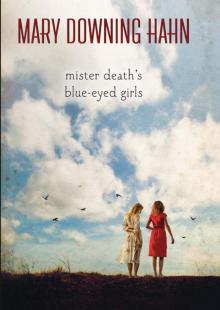 Mister Death's Blue-Eyed Girls
Mister Death's Blue-Eyed Girls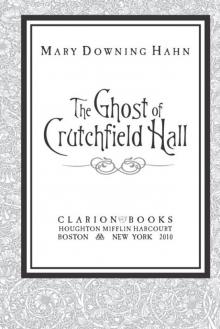 The Ghost of Crutchfield Hall
The Ghost of Crutchfield Hall Hear the Wind Blow
Hear the Wind Blow Time of the Witch
Time of the Witch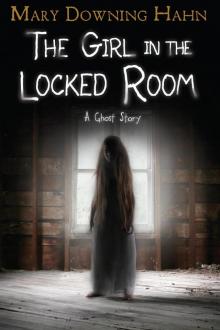 The Girl in the Locked Room: A Ghost Story
The Girl in the Locked Room: A Ghost Story All the Lovely Bad Ones
All the Lovely Bad Ones One for Sorrow
One for Sorrow Deep and Dark and Dangerous
Deep and Dark and Dangerous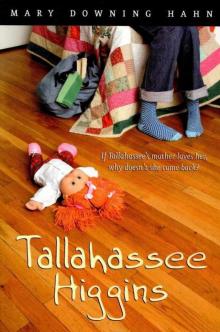 Tallahassee Higgins
Tallahassee Higgins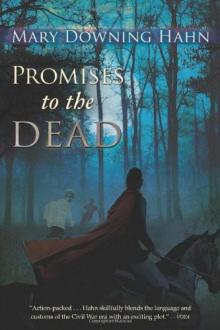 Promises to the Dead
Promises to the Dead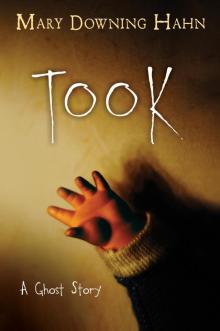 Took: A Ghost Story
Took: A Ghost Story Following My Own Footsteps
Following My Own Footsteps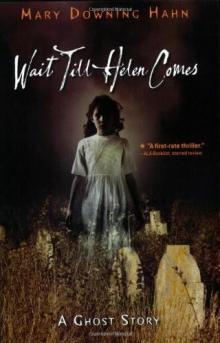 Wait Till Helen Comes: A Ghost Story
Wait Till Helen Comes: A Ghost Story Where I Belong
Where I Belong The Spanish Kidnapping Disaster
The Spanish Kidnapping Disaster Look for Me by Moonlight
Look for Me by Moonlight The Old Willis Place
The Old Willis Place Closed for the Season
Closed for the Season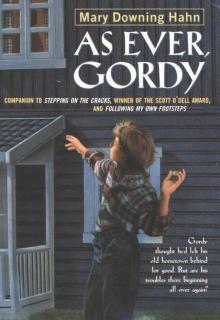 As Ever, Gordy
As Ever, Gordy Anna on the Farm
Anna on the Farm The Doll in the Garden
The Doll in the Garden Daphne's Book
Daphne's Book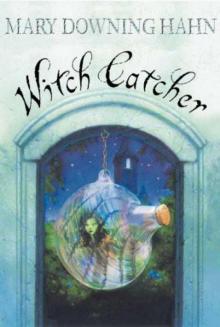 Witch Catcher
Witch Catcher The Gentleman Outlaw and Me--Eli
The Gentleman Outlaw and Me--Eli Wait Till Helen Comes
Wait Till Helen Comes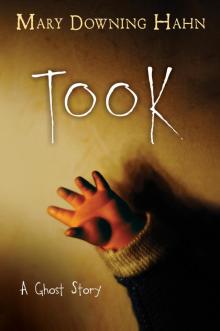 Took
Took A Haunting Collection
A Haunting Collection Anna All Year Round
Anna All Year Round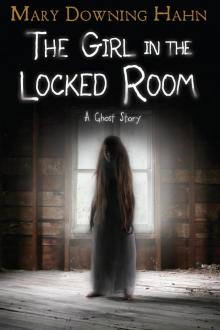 The Girl in the Locked Room
The Girl in the Locked Room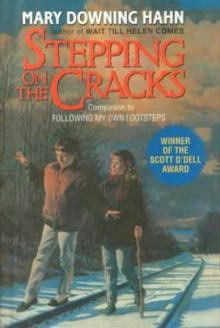 Stepping on the Cracks
Stepping on the Cracks